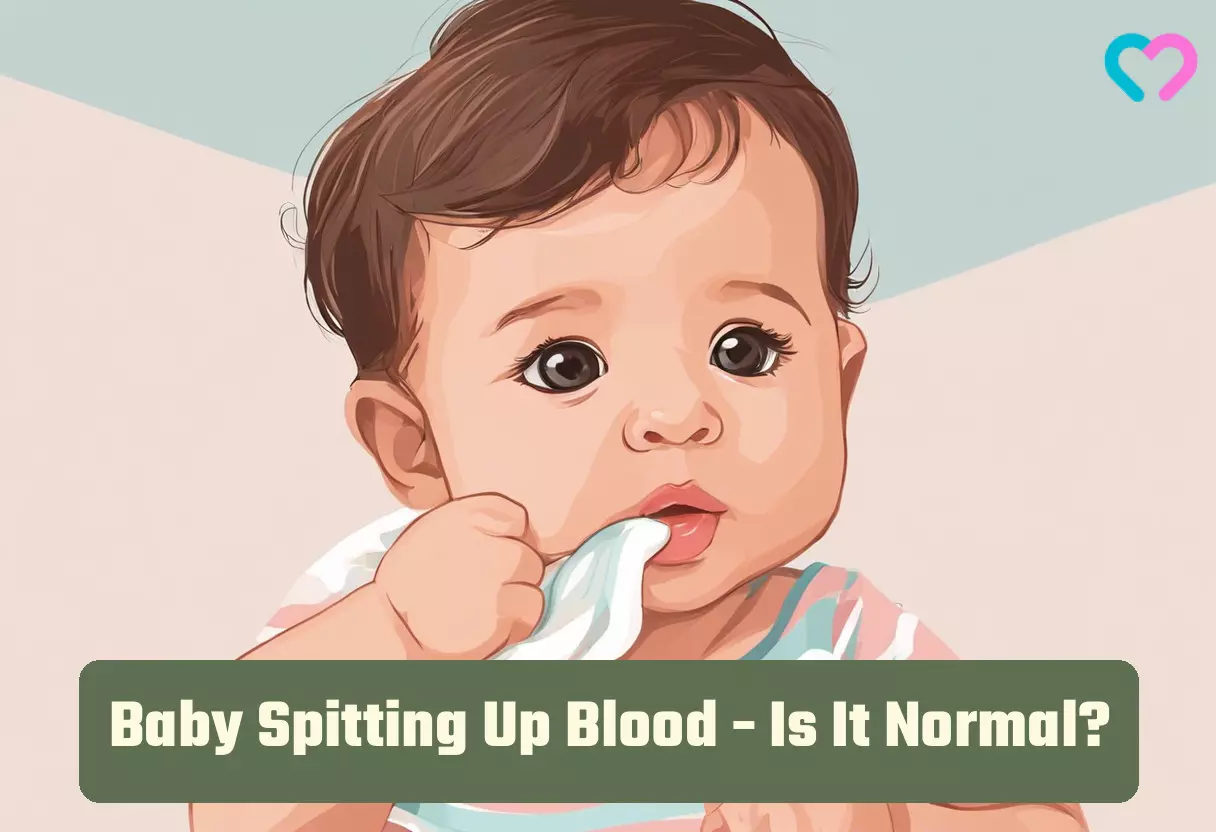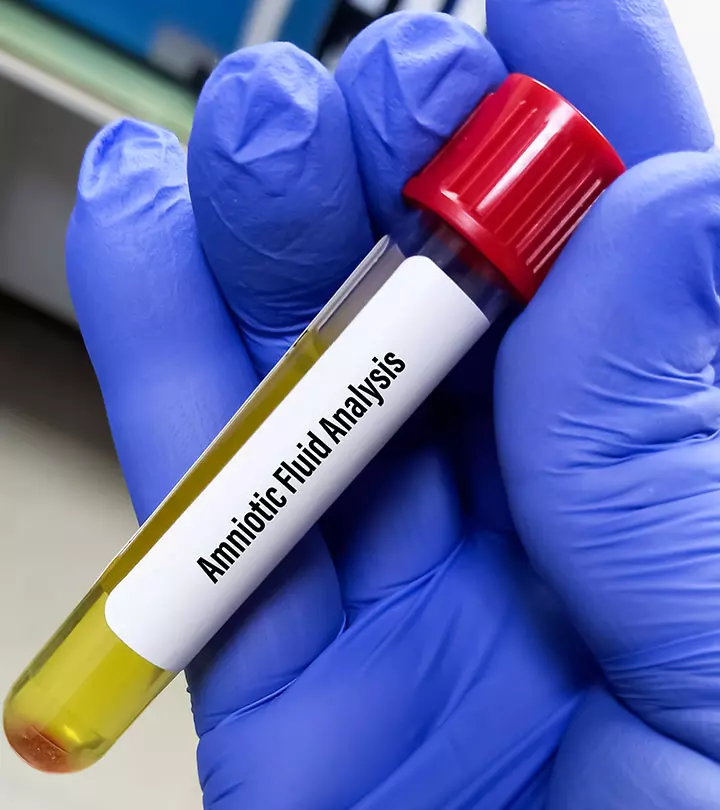
Image: Shutterstock
Breastfed babies often spit up thin milky fluid, while formula-fed babies spit up a type of material that looks like cottage cheese. However, if you see your baby spitting up blood, you might be extremely worried as a concerned parent.

Spitting up fluids through the nose and mouth is pretty common in babies. But if you see your tiny tot spitting up bright brown or red blood alongside milky fluid, you may be alarmed.
Spitting up blood may not always be an indicator of a medical condition in babies. If your baby is active and healthy, it is highly unlikely that an underlying condition is the reason for them spitting up blood. However, it is wise to consult a pediatrician and get a thorough checkup. Read on to know the common causes of babies spitting up blood and when to be concerned.
Key Pointers
- Spitting up red or pink-tinged specks may result from the mother’s painful nipples or from swallowing maternal blood during delivery.
- Spitting up blood in babies can also be caused by forceful spitting up and esophagitis.
- Burping after every feeding, using a nipple shield if the mother has sensitive nipples, and refraining from giving the baby medications that could result in esophagitis are all ways to lessen spitting up in babies.
- A pediatrician should be consulted if the baby continues to spit up blood, exhibits symptoms like fever, lethargy, or green vomiting, or if the blood does not stop after a few days.
Is It Normal For Babies To Spit-up Blood?

Spitting-up of blood is definitely a concern in babies, whether neonatesiNewborns less than four weeks old or infants. Neonates may spit-up of red or pink-tinged flecks could be due to swallowed maternal blood during delivery. This happens in the first few days after delivery. For older breastfeeding babies, bloody vomit could be due to the ingesting maternal blood or swallowing blood from cracked and sore nipples. But in both cases that is flecks of blood.
Although not always a cause for concern, seeking medical advice is recommended if you notice multiple blood streaks or your baby appears unwell or shows persistent irritability. Board-certified nurse practitioner Samantha shares her insights in the vlog, saying, “If your baby cries for more than three hours per day, is very irritable, or spits up fluid that appears green, yellow, bloody, or looks like coffee grounds, be sure to contact your pediatrician, especially if these symptoms begin after the age of six months (i).”
Causes Of Baby Spitting Up Blood
There could be several reasons why the baby spits up blood, including conditions that may require medical attention. Understanding why do babies spit up blood can help identify whether it’s due to something minor or a more serious issue.
1. Cracked and sore nipples

In most breastfeeding babies, the blood the baby spits up is usually from the mother and not from the baby’s body system (1). It can happen if you have sore or cracked nipples. It is common for nursing moms, especially those who have just started nursing to experience irritation in the nipples due to the pulling and pressure, or because of the exposure of skin to saliva. It may turn so bad that the skin cracks and bleeds. It subsides with the healing of nipples.
Most of the time, a healthy breastfeeding infant who spits up a little blood would have swallowed it from the mother’s sore nipple. The blood irritates the tummy, and it regurgitates. If you do not see any crack, try to express some milk and check if it emits a blood tinge. However, the blood is streaks of blood, never frank bloodiVisible presence of blood in stool . Always check the mother’s nipples for cracks.
A new dad and vlogger recall how they identified the reason behind his daughter May’s blood-streaked spit-up. He explains, “We switched to bottle-feeding to eliminate any blood from the cracked nipple. So, for the next four or five feeds, we exclusively bottle-fed. We monitored her temperature, the amount she fed, and the stools. For the next three stools she passed, we kept an eye.
“For the first two, there were still these black streaks. However, for the third one, it seems that the black streaks have decreased significantly, much less. By the fourth stool, it returned to normal, and there were no more black streaks in the stools. So that confirms that it was due to the micro-cracks that my wife probably had during direct latching, but she was not aware of them (ii).”
If you observe blood in your breast milk or on your nipple, offer some sugar water or plain water to your baby after feeding, so that the blood clears away from their tummy. Stop feeding through the cracked nipple for a few days until it heals. You can use a nipple shieldiA breastfeeding tool shaped like a shield placed over the nipples , which is available in pharmacies, to avoid irritation to the healing nipple. You can still breastfeed your baby from the same breast.
The blood that passes with the breast milk will also mix with the food in the intestine, and sometimes result in the appearance of bloody stools.
If you find no blood from the nipple, or if your baby is on formula feed and you can still find them spitting blood, your baby should be immediately taken to the doctor.
2. Swallowed blood during delivery
If your baby spits up blood shortly after birth, there is nothing to worry about. It may be the maternal-fetal blood your baby might have swallowed during delivery (2). The blood usually subsides after one or two days, but if it continues to come, consult a doctor.
 Did you know?
Did you know?3. Forceful spitting up

In rare cases, your baby may forcibly spit up, causing a tiny tear in the blood vessel present in the esophagusiA hollow organ through which food and water pass from the throat to the stomach . It is nothing of worry again, as it heals quickly with time (3). Forceful spit-up can sometimes be a sign of gastroesophageal reflux disease (GERD), which may also cause blood-tinged vomit (13).
Pediatrician Dr. Kishor Tewary discusses a rare but serious food allergy in infants that can cause blood in vomit, “Food protein-induced enterocolitis syndrome (FPIES) is a non-IgE-mediated gastrointestinal food allergy. It causes repeated, severe vomiting, sometimes with diarrhea, leading to dehydration and lethargy in acute cases. Chronic cases may involve watery diarrhea with vomiting, weight loss, failure to thrive, dehydration, and metabolic issues. It mainly affects infants, and is commonly triggered by cow’s milk or soy protein, though other foods can also be triggers.”
4. Esophagitis
It is an inflammation that damages the tissues in the esophagus, the muscular tube that delivers food from the mouth to the stomach (4). This sometimes occurs as a medication side effect when the baby is given medicines, such as anti-inflammatories or antibioticsiMedicines used to treat bacterial infections in humans , causing gastritisiInflammation of the stomach lining .
5. Clotting disorders
Pediatric blood clotting disorders occur when the blood clotting process in the body is abnormal (5). For instance, clotting disorders such as sickle cell diseaseiAn inherited set of blood disorders that cause the red blood cells to be hard, sticky, and sickle-shaped in appearance cause blood cells to stick and prevent smooth blood flow, resulting in pulmonary embolism (6). A pulmonary embolism occurs when a blood clot migrates to the lung, leading to elevated blood pressure in the pulmonary arteriesiArteries that carry deoxygenated blood from the heart to the lungs . This condition is often characterized in babies by shortness of breath, chest pain, and coughing up blood (hemoptysis) (7) (8).
 Research says
Research saysWhen To Call The Doctor?

If none of the above causes are the reasons behind your baby spitting up blood, and if it continues to persist, you should take them to a pediatrician. Experts from the American Academy of Pediatrics (AAP) recommend consulting a doctor if a baby vomits after every feeding, and it is accompanied by blood (9).
Board-certified diplomate of the Philippine Pediatric Society, Dr. Maria Carmela Villania-Mamauag advises, “As long as the baby has no other symptoms like fever, refusal to feed, irritability, or lethargy and is feeding, sleeping well, and has normal urine and bowel movements, parents can be reassured. However, if the baby spits up fresh blood in larger amounts along with other symptoms, a consultation with a physician is necessary.”
If your baby is having symptoms like green vomitingiVomit with bile and is usually green or greenish-yellow in color , abdominal distentioniSwelling of stomach , fever, or lethargy, reluctance to feed, you need to seek immediate medical care. Blood spit-up due to gastrointestinaliRelating to the stomach and intestine issues could be a sign of a major underlying medical concern, such as gastrointestinal bleeding or hematemesis (a condition marked by vomiting blood) (in rare cases).
Tips To Reduce Spitting Up In Babies

Seeing a baby spitting up blood can be concerning. While occasional spotting is normal, you should consult a doctor if it persists or worsens. In the meantime, you can try some simple tips to reduce the frequency of your baby spitting up (9):
1. Burp your baby
Take time to burp your baby after each feeding session. It can keep the air from building up in your baby’s stomach and avoid spit-ups. You may try different burping positions, such as holding the baby over your shoulder or sitting them on your lap, while gently patting their back. Always support the baby’s head, spine, and neck in any position.
2. No physical activity
Keep your baby upright for at least 30 minutes after every feed. Avoid immediate active play or use of swings. Also, avoid pressing on a baby’s belly (tummy time) right after eating.
3. Small and frequent feedings
Try smaller and more frequent feeding sessions. As the baby’s stomach is small, do not overfeed them in a single session.
 Quick tip
Quick tipFrequently Asked Questions
1. Does spit-up mean overfeeding?
Babies spitting up milk after feeding can often be related to overfeeding breastmilk or formula (3).
2. Why is my baby spitting up purple?
Purple spit-ups mainly occur if your baby is treated for GERDiCondition in which stomach acid moves up into the food pipe and irritates the lining with (es)omeprazole. It is not a cause for concern but should be considered as a sign indicating the reduced efficacy of the treatment (10).
3. Can spitting up be a sign of allergies?
Spitting up may rarely indicate an allergy if the baby is intolerant to the cow or soy milk proteins in their formula (9). However, there is insufficient evidence to confirm if this spit-up contains blood, so medical advice and further diagnosis may be needed.
When a baby spits up blood, it is concerning to a parent. A baby spitting up blood could be due to benign or concerning reasons. If your baby is spitting up blood, consult a pediatrician to know the exact cause. Also, note if you have sore or cracked nipples as the baby may accidentally follow blood from there, thus giving the impression of spitting up blood. You may also try the above tips to ensure the baby is not strained after feeding, which could help avoid forceful blood-spitting.
Infographic: Babies Spitting Up Blood: Signs You Should Not Ignore
Babies spitting up blood could be a concerning sight for parents; however, when they do this occasionally, it may not be due to a serious pathological condition. Nevertheless, contact a pediatrician instantly if your baby is spitting up blood too often and has additional symptoms, such as those listed in this infographic. Illustration: Momjunction Design Team
Illustration: Baby Spitting Up Blood - Is It Normal?

Image: Stable Diffusion/MomJunction Design Team
Gain insights about why your baby is spitting up, when you should be concerned about it and tips to help contril the same.
Personal Experience: Sources
MomJunction articles include first-hand experiences to provide you with better insights through real-life narratives. Here are the sources of personal accounts referenced in this article.
i. Baby Spit-Up vs Vomiting: What Every Parent Should Know | Expert Guide | Red Flags & When to Worryhttps://www.youtube.com/watch?v=s-IGZvcPRBQ
ii. Blood in milk spit-up and Black Streaks in Baby Stool | Experience Sharing | What is happening?;
https://www.youtube.com/watch?v=NL-bfxz2_Go
References
1. Unusual appearances of breastmilk; Australian Breastfeeding Association
2. Vomiting in neonates; Victorian Agency For Health Information
3. Spitting Up – Reflux; Seattle Children’s
4. Esophagitis in Children; Boston Children’s Hospital
5. Pediatric Blood Clotting Disorders; UT Health San Antonio
6. Complications of SCD: Blood Clots; Centers for Disease Control and Prevention
7. Pulmonary Embolism; Nationwide Children’s Hospital
8. Sahnoun M et al; Massive Pulmonary Embolism as a Rare Cause of Sudden Infant Death: Medico-legal Implications; Neonatal and Pediatric Medicine
9. Why Babies Spit Up;Healthy Children; American Academy of Pediatrics
10. Florence van Hunsel et al.; (2016); (Es)omeprazole and Discoloration of Regurgitated Gastric Contents in Infants: Worrying for Care-Takers and a Sign of a Reduced Bioavailability; National Library Of Medicine
11. M H Moustafa et al.; (2005); “My two-week-old daughter is throwing up blood”; National Library Of Medicine
12.Why is my baby spitting up so much breast milk?; Texas Children’s Hospital.
13.Gastroesophageal Reflux Disease (GERD) in Infants; Nationwide Children’s Hospital
Community Experiences
Join the conversation and become a part of our nurturing community! Share your stories, experiences, and insights to connect with fellow parents.
Read full bio of Dr. Mubina Agboatwalla
- Dr. Kishor Tewary is a senior consultant pediatrician with a special interest in pediatric urology and nephrology. He worked as a consultant pediatrician and nephrologist in India before moving to the UK for advanced training in 1997. Dr. Tewary has been practicing in the UK since 2007 and has served national regulatory and educational bodies in various positions, including as an associate professor at the St George's University of Medicine Grenada, senior lecturer at Birmingham University Medical School, and MIMS assessor at Aston University Medical School.
 Dr. Kishor Tewary is a senior consultant pediatrician with a special interest in pediatric urology and nephrology. He worked as a consultant pediatrician and nephrologist in India before moving to the UK for advanced training in 1997. Dr. Tewary has been practicing in the UK since 2007 and has served national regulatory and educational bodies in various positions, including as an associate professor at the St George's University of Medicine Grenada, senior lecturer at Birmingham University Medical School, and MIMS assessor at Aston University Medical School.
Dr. Kishor Tewary is a senior consultant pediatrician with a special interest in pediatric urology and nephrology. He worked as a consultant pediatrician and nephrologist in India before moving to the UK for advanced training in 1997. Dr. Tewary has been practicing in the UK since 2007 and has served national regulatory and educational bodies in various positions, including as an associate professor at the St George's University of Medicine Grenada, senior lecturer at Birmingham University Medical School, and MIMS assessor at Aston University Medical School. - Dr. Maria Carmela Villania-Mamauag is a board certified diplomate of the Philippine Pediatric Society with a degree of Doctor of Medicine from Our Lady of Fatima University, Valenzuela City and a Bachelor in Science in Psychology from Saint Louis University, Baguio City which was augmented by a year of Bachelor in Science in Family Life and Child development at the University of the Philippines, Diliman, Quezon City.
 Dr. Maria Carmela Villania-Mamauag is a board certified diplomate of the Philippine Pediatric Society with a degree of Doctor of Medicine from Our Lady of Fatima University, Valenzuela City and a Bachelor in Science in Psychology from Saint Louis University, Baguio City which was augmented by a year of Bachelor in Science in Family Life and Child development at the University of the Philippines, Diliman, Quezon City.
Dr. Maria Carmela Villania-Mamauag is a board certified diplomate of the Philippine Pediatric Society with a degree of Doctor of Medicine from Our Lady of Fatima University, Valenzuela City and a Bachelor in Science in Psychology from Saint Louis University, Baguio City which was augmented by a year of Bachelor in Science in Family Life and Child development at the University of the Philippines, Diliman, Quezon City.
Read full bio of Swati Patwal
Read full bio of Rohit Garoo
Read full bio of Ghazia Shah
















